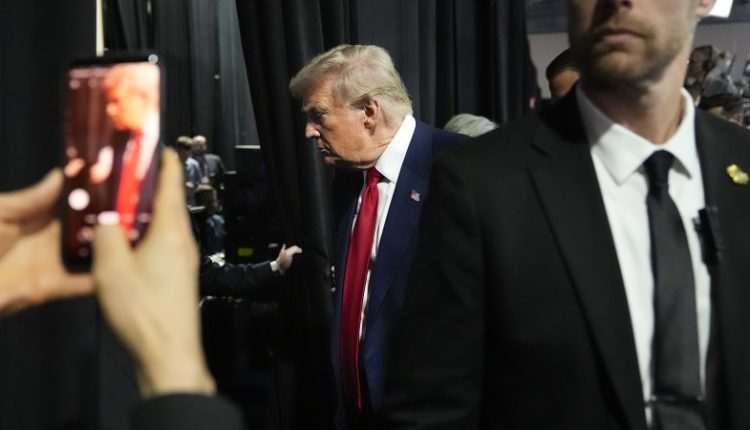A version of this story appeared in CNN Business’ Nightcap newsletter. To get it in your inbox, sign up for free, here.
The Republican nominee for president went on live TV and presented an unhinged, debunked Facebook rumor as fact. When corrected (several times) by a moderator, Donald Trump doubled down: “The people on television say their dog was eaten by the people that went there.”
“They’re eating the dogs,” quickly became a punchline among commentators who understand that the whole story about Haitian immigrants eating people’s pets in Ohio was a lie, rooted in a well-established racist history.
It’s the kind of outrage-bait that, while disgusting, is hardly unexpected on Facebook these days.
But the claim’s elevation to the presidential debate stage underscores a grim reality about the internet in 2024: Misinformation is everywhere, platforms are giving up on moderation and AI is making it all worse.
Trump’s debate performance “was like a 4chan post come to life,” said CNN’s Jake Tapper.
It’s an apt analogy.
4chan, once an innocuous online message board for anime enthusiasts in the early 2000s, is a prime example of what happens when you remove the guardrails from a social media site, with only a handful of community members regulating it. Over the years, 4chan has become a cesspool of violence, conspiracy theories and its own particular brand of “edgelord white supremacy,” as the Verge put it.
Scrolling on Facebook or X, it’s hard not to see some of that chaos creeping into the mainstream.
As my colleague Clare Duffy wrote last week, Facebook spam is surging, and, in extreme cases, it is being weaponized to scam and mislead people — a shift that coincides with an intentional strategy by the platform to downplay news and politics while amplifying vapid, computer-generated content into users’ feeds.
Over on X, which Elon Musk acquired in 2022 and promptly gutted its moderation efforts, hate speech and violent threats are now fair game.
A spokesperson for Meta, Facebook’s parent company, said last week that it works “to remove and reduce the spread of spammy content to ensure a positive user experience” and “take action against those who attempt to manipulate traffic through inauthentic engagement.”
Musk, who fired Twitter’s communications staff when he took over the platform, didn’t respond to a request for comment.
To be sure, there’s always been gross and fake stuff on social media. The difference now is how quickly it morphs into misinformation, often fueled by human-like AI text and images, with fewer staff dedicated to monitoring and taking down fake information. Once upon a time, you had to go through a process, overseen by human moderators, to get a “verified” check mark on Twitter; now, anyone with or without an agenda to push can simply buy it.
In some ways, Trump’s political career tracks the rise and deterioration of social media over the past decade. The former reality star made his name in politics in part by exploiting social media’s power to broadcast lies and conspiracy theories to the masses, starting with his racist “birther” attacks on President Barack Obama.
With Tuesday night’s foray into the pet-eating lie, he may have finally veered so deep into the internet muck he can’t see through it.
Just a few weeks ago, the former president posted an AI-generated image on his Truth Social platform that suggested Taylor Swift had endorsed him. “I accept,” he wrote in the post.
Of course, it was a fake image — the same kind of obvious AI slop that has overrun Facebook and X. Either Trump didn’t know the image was fake, or he didn’t mind lying to his followers and perpetuating the fake endorsement.
Neither scenario suggests he’s too concerned about the problem of misinformation online.
Taylor Swift, for her part, is concerned. In endorsing Vice President Kamala Harris on Tuesday, Swift wrote that the incident with the fake images of her “conjured up my fears around AI, and the dangers of spreading misinformation.”
She signed off on the post by calling herself a “childless cat lady” — a nod to widely ridiculed comments from Trump’s running mate, JD Vance.
As if on cue, Musk, the pro-Trump multibillionaire who also shared the fake pet-eating story on X this week, chimed in to remind everyone that you can say whatever you want on his platform, no matter how vile or threatening to a woman who’s never publicly acknowledged him.
“Fine Taylor … you win … I will give you a child and guard your cats with my life.”
Read the full article here

